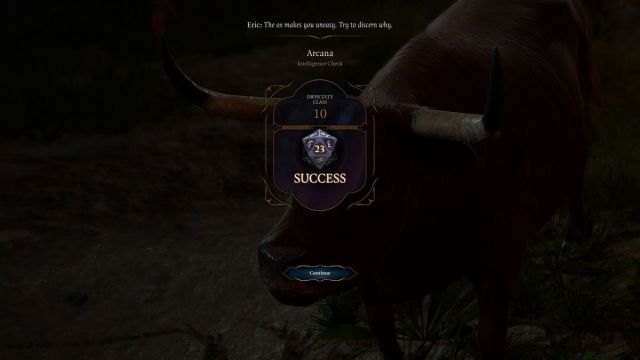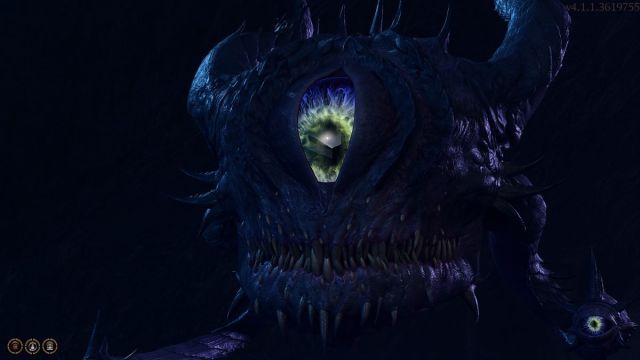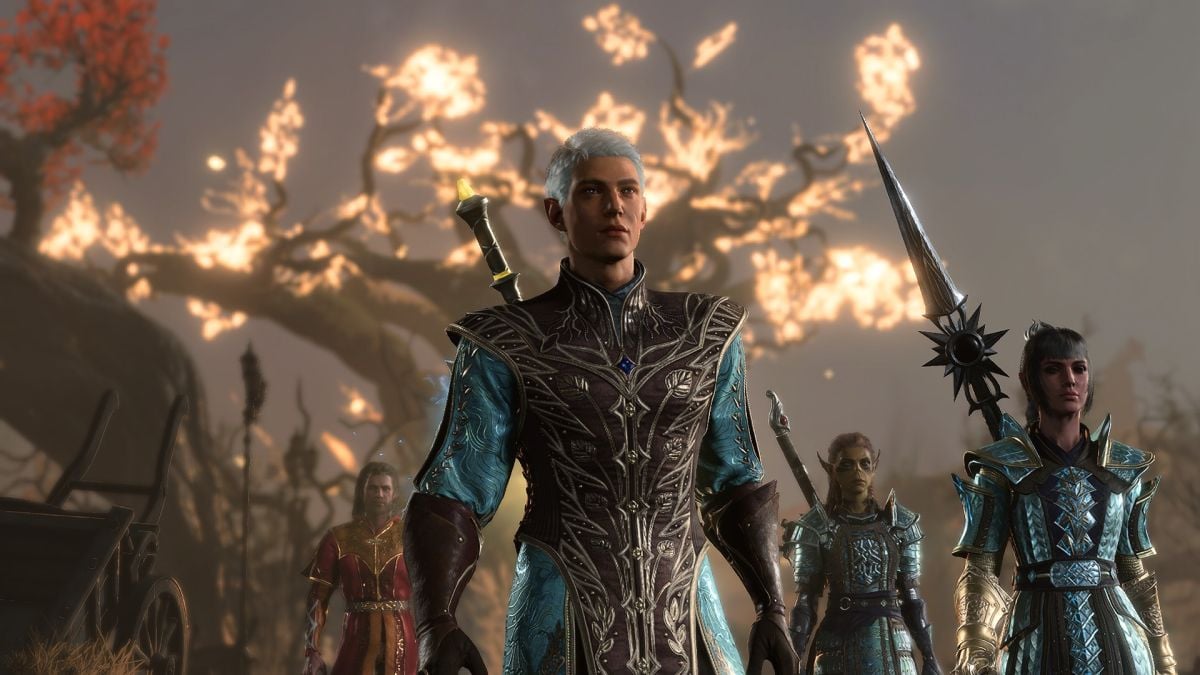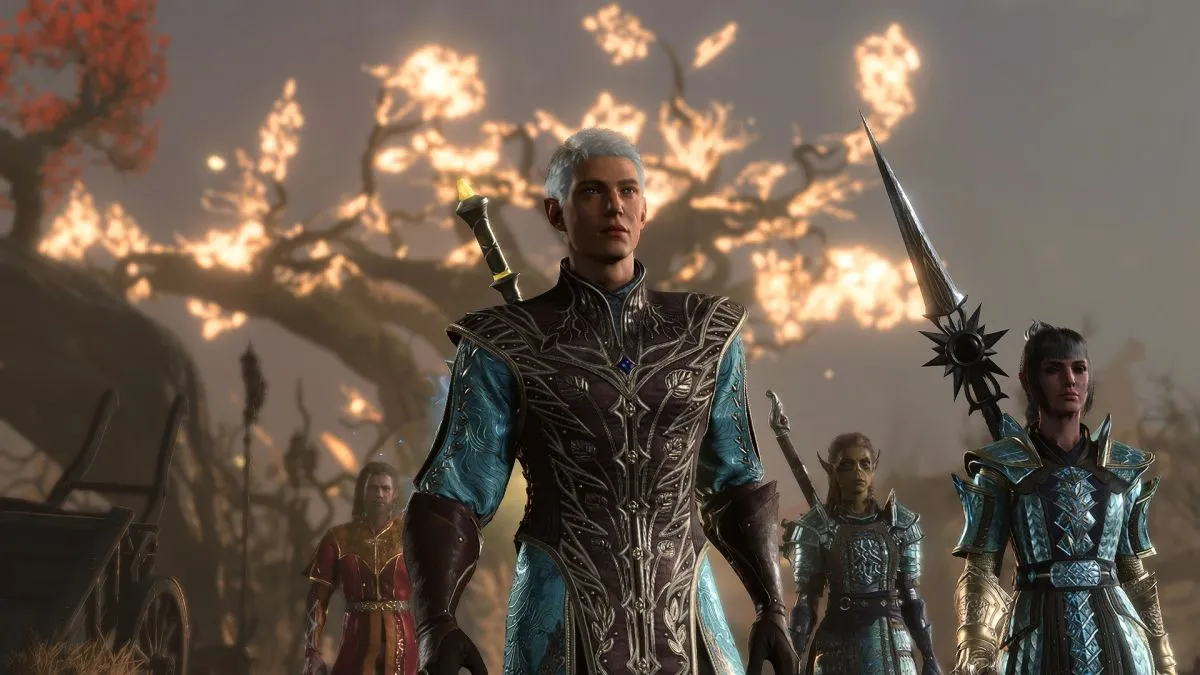Turning tabletop role-playing into a digital experience feels like an eternal conundrum. Capturing the imagination space of the tabletop and transforming it into a single-player, highly produced and catered experience is a dream that can seem a little unattainable. But Baldur’s Gate 3 gets pretty damn close.
Baldur’s Gate 3 is the third game in a series of Dungeons & Dragons RPGs originally made by BioWare; but just as importantly, it’s the latest game from Larian Studios, hot off a winning streak with Divinity: Original Sin 1 and 2.
As has already been discussed to death, plenty of individual factors account for Baldur’s Gate 3 success: the established development history of Larian, years of relative freedom in development and Early Access, the surging popularity of tabletop role-playing games, and the hunger for both a crunchy CRPG and BioWare-esque degree of production.
Yet Baldur’s Gate 3, for me, exceeds those cravings. It’s massive but focused. There’s choices big and small, affecting stories in equal measure. Companions who stand alongside genre bests, combat encounters that feel challenging and memorable, and a world that’s as much its own setting as it is built on the lengthy lore of D&D. Baldur’s Gate 3 is, in a banner year for role-playing games, simply one of the best RPGs you can play right now.
Baldur’s Gate 3 (PC)
Developer: Larian Studios
Publisher: Larian Studios
Released: August 3, 2023
MSRP: $59.99
Larian wastes little time in introducing the key driver of Baldur’s Gate 3’s story. You, among many denizens of Faerun, have been abducted by mind flayers and infected with a tadpole. This ticking time-bomb sits on your brain, waiting to turn you into a tentacled illithid monster, ripping you apart in the process. After narrowly surviving the mind flayer ship’s crash landing, you team up with other survivors for one simple, shared purpose: find a way to get the tadpole out of your head.

What makes this drive so effective is not just the immediacy and urgency of the constant danger lurking behind your eye, but how it binds your party together. The companions of Baldur’s Gate 3 are not fast friends. They are each in it for themselves, and the glue is their shared dread of a tentacled end. There are clashes over ideology and belief, while characters begrudgingly accept that going it together—however undesirable it may be—is still better than going it alone.
The crew that slays together
This framing leads to incredible arcs for individual characters. Shadowheart is an enigma, an amnesiac devotee of a goddess with more than a few secrets to keep. Lae’zel is similarly devoted to her own queen and the githyanki’s goal of eradicating mind flayers, fueling her fear of becoming one herself. Gale is ambitious, to a definite fault. Astarion is plainly a man that will ruin your life, and players are signing up for it. Wyll harbors his own demons, as does Karlach, and their stories become particularly entwined even in Act 1.

Each main companion is strong enough to be a lead, and they can be if you choose them as your Origin. Playing a custom character seems most fitting, and where most players will probably head first, but the option to play as Origin characters adds an extra nuance that’s welcome from Larian’s Divinity work.
Either way, their arcs play out incredibly well across the breadth of the game, reaching stellar narrative highs. The way each companion’s story weaves into the main plot, while still allowing room to carve out their own side niches, is simply excellent. I was a little less enthralled with Halsin, Jaheira, and Minsc. Halsin makes an interesting companion, but he only plays a major role in a set quest series and doesn’t feel as deeply connected. The same goes for Jaheira and Minsc, two returning Baldur’s Gate companions. They’re welcome additions to my camp, but they didn’t carry the same weight as the core crew.

The wild card is the Dream Guardian, who embodies the endless mysteries of what’s happening and why. Unraveling the threads of Baldur’s Gate 3 is part of the fun, especially as seemingly inconsequential moments suddenly yield significant implications. And to that point, plenty of side characters end up stealing the spotlight in their own ways. Reoccurring faces like the Infernal engineer Dammon, the sanguine experimenter Araj, and the tieflings Zevlor and Alfira that follow your journey all make Baldur’s Gate 3 feel like a journey in a living, vibrant world.
There and back again
Baldur’s Gate 3 plays out over three Acts, each of which has a broad, overarching direction but lots of space to develop and flesh out stories. I loved how each of them had very distinct offerings, with their own vibes. Act 1 is a flashpoint between secluded druids, tiefling refugees, and a cult. Different paths wind out, with their own struggles and strife, into Act 2, a desolate land that you have to gradually unlock access to while learning its history. And then, of course, the city of Baldur’s Gate.
But more than that, Baldur’s Gate 3’s individual areas are incredibly well-designed. The goblin camp, by itself, feels almost like a Hitman level in its intricacy and methods of approach. Dungeons and specialized zones all have their own approaches, each of which is valid if you can throw it together. You could try to just outright fight the goblin priestess, or you can trick her into a private conversation and throw her into a chasm. Either way gets the job done.
Role-playing like this is where Baldur’s Gate 3 shines. I played a Charisma-centric Warlock, acting as the party “face” and trying to clear what I could with conversational checks. Initially, this was just a good way to avoid combat. But as time went on, I found some of the more interesting options weren’t just in dialogue; they were in the world. I got onto roofs by stacking boxes. I raised corpses to learn information. Heck, I stacked a bunch of barrels in Karlach’s inventory so she could chuck them at enemies during fights. In its best moments, Larian feels like it is managing a predestined “yes, and” with every kooky plan you concoct.

There are limitations to this tabletop-like freedom, though, and distinctly some moments that feel a bit more video game-y. Those moments never lingered long, though. In fact, a number of them led to really compelling combat encounters that pushed and challenged me to engage with all the tools I had. Challenges that asked me to take out certain foes, escape within allotted turns, or other requirements were where I felt my understanding of Baldur’s Gate 3’s systems was put to the test.
It’s here where you can see how Larian’s lineage from Divinity lines up and branches out from the Dungeons & Dragons framework. There’s a really interesting mix of D:OS’ highly interactive, laid-out environments and the combat language of D&D. It’s a playground for build experimentation, interactivity, and moments where you have to open the combat log and scour for just exactly why everything exploded. The same system that rewards my careful, thoughtful builds meant to max out damage also lets me turn angry bosses into sheep. It’s great.
To arms
Combat itself ranges from interesting to overwhelming, depending on an encounter’s scope. Everything is fairly well paced out, so you’re not running into big fights too often unless you’re determined. Mastering the natural rhythm of move-action-bonus action means grappling with all the different ways you can bend, and break, those rules to your own advantage. In some ways, it’s liberating, like getting an easy kill on an enemy by pushing them off a cliff. Other times it’s frustrating, like when an enemy gets an easy kill by pushing you off a cliff.
As the possibility space of what you can do expands, Baldur’s Gate 3 only gets more involved and complicated. While the level 12 cap might seem low, there are tons of spells and items along the way that routinely change up how you tackle fights. Tack on multi-classing, and it really feels like I’ve only scratched the surface of how intricate character builds can become.

So much of Baldur’s Gate 3, even in its launch state, feels like a foundation for more. That also carries over to its performance and technical hiccups, too. While Act 1 feels very polished and refined—symptomatic of its years-long stint in Early Access—Baldur’s Gate 3 starts to encounter more bugs and performance hitches the deeper players get. Act 3, at the time of writing, is particularly noticeable; I’ve had performance issues in the massive city, as well as moments of clipping through objects, misaligned cameras during conversations, and dialogues where characters thought I’d made a choice I hadn’t. Different narratives and ideas felt like they fell a bit by the wayside, by story’s end. The frays certainly show in those moments.
It’s hard for me to dock Baldur’s Gate 3 too much for these issues, though. It’s not that they don’t exist, but it’s more like they only momentarily impede, usually just reminding me to be liberal with my save usage. And yes, save scumming can and will happen, whether in combat or just to see how different outcomes play out. Though BG3 is a generous GM with how much Inspiration (free rerolls) it gives you, sometimes the dice just don’t go in your favor. In fact, some of my favorite storytelling happened when the dice failed me. And let me say, seeing the dice roll in real time? Excellent touch.

So yes, I have gripes. But I don’t mind them, in the scheme of things, because what Larian’s built feels worth enduring a few bumps along the way. The incredible highs of the story, the way choices plainly and effectively branch out in front of you, and the memorable encounters all combine for a role-playing experience that is simply, absolutely worth playing.
All along the Sword Coast
I’ve barely touched on the incredible voice acting from the main cast, or the wonderful music, or even the vistas that sit behind some of Baldur’s Gate 3’s most scenic locales. Or how it manages to find a pretty solid approach to playing CRPGs on controller, another sign of Divinity in BG3.
There’s an entire way of playing through a custom Origin called the Dark Urge, which I’ve started a new file under. It’s an inventive way of providing a defined origin and central conflict for a customizable character, and has led to my new story feeling completely different from the old one, despite taking place in the same areas. Add on multiplayer, and there are so, so many ways to experience and re-experience this game that all feel rewarding.
There has been a rising tide of CRPG love over the last few years, through developers like Obsidian, ZA/UM, and Owlcat Games continuing to build out a seemingly niche genre. It’s poetic that Larian, arguably a leader on that front with Divinity: Original Sin’s Kickstarter back in 2013, is now at the forefront a decade later with Baldur’s Gate 3. It’s every bit the culmination of those years of work, and a well-crafted sequel to a pillar of the genre.

It’s always hard to assess, in the post-review haze, how I’ll feel about a game years later. How I might look back on the characters, story, and world of any given game. And even after 120 hours and change in Baldur’s Gate 3, I’m still working my way through all these feelings; how stories played out, how my own custom character’s tale came to a dismally bittersweet end, and what possibilities may still lie in wait for future playthroughs.
But I do know that I won’t forget about Baldur’s Gate 3 anytime soon. Characters like Lae’zel and Karlach will stick with me. Moments of pain, wrought over what choice to make, or praying that the die will roll in my favor to keep this party together, will rekindle when I see fan art. Grand battles, whether on top of a looming tower or down deep in the Underdark, will still be recognizable at a glance, and I’ll reflect on how much fun it was to solve their intricacies. Even though it takes place in the world of D&D, Baldur’s Gate 3 carves out its own voice and character, from big plot beats to the little details.
Larian Studios has made something truly incredible, and even as the studio continues to fine-tune and polish with post-launch patches, Baldur’s Gate 3 feels like something absolutely worth playing now, and even more in the future. Baldur’s Gate 3 is a legendary RPG, and one that anyone with a love of storytelling, strategizing, or just thirsty for a few fantasy companions should take the time to experience.









